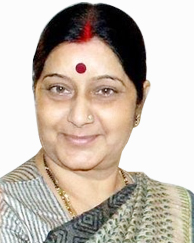(Nepal Foreign Affairs, DECEMBER 8)– On Monday, 7th December, India’s External Affairs Minister Sushma Swaraj took time to address the Upper House of Indian parliament responding to the questions on Nepal raised by the members. Most of the questions were pertinent and  sharp.
sharp.
It was expected and interesting to know that the experienced members like Sharad Yadav, Dr. Karan Singh, DP Tripathy are very well-informed about Nepal affairs. But the most outstanding of them was Mani Shankar Aiyer. He not only researched about the current Nepal issues, but also presented them convincingly in the House.
In response, Sushma Swaraj tried to defend her government and policies towards Nepal. She was defensive at best. In her speech, she made some true statements but she mostly misinformed the Indian parliament regarding the new constitution and current situation in Nepal.
First, some true statements.
- “This is not the first time India has imposed a blockade against Nepal….In 1989, similar blockade ran for one year four months”.Call it a Freudian slip or whatever; this statement comes as an acceptance of India’s economic blockade on Nepal. Minister Swaraj must be thanked for telling the truth to the world. Otherwise, India has officially been denying the blockade and putting it on the Nepali side. Our position is clear, like the overwhelming number of Nepalese on this issue: It is India blockading Nepal, putting forward its pawns of the Madhesi parties.
- “Despite India’s advice to wait, Nepal’s constitution was promulgated”. Truly, Nepali leaders did a good thing by promulgating the constitution. Indian advice came at the last of the proverbial eleventh hour. After the noodle was eaten, India wanted it to be converted again into the flour. It was impossible to stop the Constituent Assembly at that point.
- “Above 11 thousand trucks are waiting in India to enter Nepal”. True, after blockade, it was bound to happen.
- “Nepal didn’t give the list of required medicines to be airlifted despite India asking it”. Indian government must be clear about one thing: Nepal at the moment is being punished for making a democratic, secular constitution. Expecting Nepal’s cooperation to prove India’s selective piety is out of question. Nepal will not provide a list. Either all trucks come, or nothing comes.
Let’s come to the false statements now. These statements are often propagated by the Indian media, former diplomats and bureaucrats to make their point against Nepal’s new constitution. It is surprising that the ruling Bharatiya Janata Party (BJP), despite its close relations with Nepal, depends wholly on the propaganda over facts.
- “Nepal’s constitution was passed without debate in a few days”. The House was itself saying time and again that Nepal’s constitution making process was an arduous task spanning over seven years. The first Constituent Assembly (CA), elected in 2008, discussed the content of the new constitution but failed to proclaim one. Second CA was elected in 2013. After a long discussion, a first draft of the constitution was presented to the people in August 2015. This draft was debated in the CA, and among the people. Nepal’s constitution was debated for seven years, and passed on September 20, 2015, after several weeks of deliberations.
- “Modi Government doesn’t want the Hindu State (and Monarchy) back in Nepal”.One cannot say about the monarchy, but with regards to Hindu State, the ideas of ruling BJP are very clear and unwavering. The word “secularism” itself pinches BJP so much. And in terms of Nepal, they have a clear strategy. They don’t want to involve the government directly in the Hindu state campaign.
On behalf of the BJP, its Secretary General Ram Madhav has been deployed to see this through. He coordinates BJP and Modi government on Nepal affairs. Ram Madhav, on behalf of the BJP and its government, had proposed Nepal as a Hindu State during the meetings with former Nepal prime ministers Sher Bahadur Deuba and Puspa Kamal Dahal when they were in Delhi last year.Nepali leaders had replied that it was subject to debate in Nepal.
- “Foreign brides married with a Nepali are deprived of a Nepali Citizenship”. This is a blatant lie. In Nepal, the women’s groups are concerned about the constitutional provision that provides immediate citizenshipto foreign women married with a Nepali man (Part 2, Article 10-15), but doesn’t provide similar citizenship to a foreign man who marries a Nepali woman, and to the children out of such marriages. This is where the dissent is.
- “Proportional inclusion that was guaranteed by the Interim Constitution has been deleted.” This is so wrong and has been the dearest weapon of the propagandists. The article 50 of the new constitution clearly guarantees proportional inclusion in all state instruments. 45% of the seats in the government jobs are set aside for reservation.
- “Modi government has improved relations with Nepal”.Yes, but that was last year. At this point, Nepal-India relations have nosedived. In Nepal, the mindset of an entire generation has turned against India. Relations may repair, but changing mindsets takes a long time.

